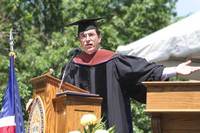Next month, the surviving Beatles will reunite onstage for a concert to raise money to instruct at-risk youth in transcendental meditation (TM), the practice that the Fab Four famously adopted after their life-changing trip to India in 1968.
The concert (April 4 at Radio City Music Hall in NYC) is a fundraiser for the David Lynch Foundation (the creator of “Twin Peaks” is a 30-year TM practitioner), and in addition to Paul McCartney and Ringo Starr, it will feature Sheryl Crow, Moby, Ben Harper, Eddie Vedder, and Donovan.
In the concert announcement, McCartney said of TM, “In moments of madness, it has helped me find moments of serenity.” The Lynch Foundation is looking to bring that same meditative gift to a million at-risk youth. The Foundation already invests millions of dollars to sponsor “Quiet Time” programs in schools, using meditation to relieve stress, prevent substance abuse, and foster creativity and academic performance.
Pretty inspiring stuff, to be sure.
But at the risk of getting in trouble, I’d like to raise a question. Is meditation instruction really the best use of millions of dollars’ worth of youth programming energy? I admit that my first thought here was, “Do those kids have enough good food to eat? Do their schools have enough books? Do their parents have the resources they need to care for them?”
Even as I write that, I immediately see the other side of the coin, that the life skills that young people can learn through TM and other meditative techniques will help them cope better and live stronger through a tough period than any soup kitchen meal or library drive ever could.
But still. It’s lean times out there. Does anyone else have the same reaction I did?

